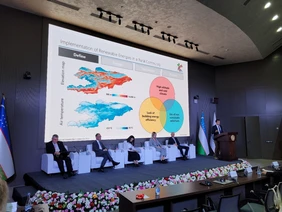From 18-19 October 2022, the second CLIENT II Stakeholder Conference for Central Asia took place in the framework of the Uzbek Inno-Week 2022 "Green Innovations for Sustainable Development". The stakeholder conference was organized by the Central Asian Sustainable Innovation Bureau (CASIB) with the support of the Federal Ministry of Education and Research (BMBF), the Ministry of Innovative Development of the Republic of Uzbekistan, the DLR project management agency, and the AHK Central Asia. The Institute of new Energy Systems (InES) was invited to present the institute’s research activities in Central Asia. Prof. Wilfried Zörner and Mr. Kedar Mehta presented the topic “Implementation of Renewable Energies to Protect Natural Floodplain Forests of the Naryn River in Kyrgyzstan”. At the CASIB Conference, InES highlighted the successes and challenges of the Real Lab development project and share the lessons they have learned along the way. They also discussed the importance of such initiatives in promoting innovation, creativity, and collaboration in the fields of engineering, science, and technology.
During the CASIB Stakeholder Conference 2022, the experts from InES took advantage of the opportunity to meet with representatives from Uzbek universities. These meetings were aimed at establishing research cooperation between the Technical University of Ingolstadt (TH Ingolstadt) and the universities in Uzbekistan. The team visited the Tashkent Institute of Irrigation and Agricultural Mechanization Engineers and Kimyo International University in Tashkent to discuss potential research cooperation. These universities have a strong focus on the development of sustainable agricultural practices and the use of innovative technologies, making them ideal partners for InES in their research efforts. The meetings were very productive, and the experts from InES were impressed by the expertise and passion of their Uzbek counterparts. Both sides discussed a wide range of topics, from renewable energy solutions to sustainable agriculture practices. They also exchanged ideas on how they could collaborate on future research projects and identified areas where they could provide mutual support. The establishment of research cooperation between TH Ingolstadt and Uzbek universities is a significant step towards advancing the development of sustainable energy practices in Uzbekistan.
Additionally, the team InES has been proactive in establishing partnerships with local organizations in Uzbekistan. By building strong relationships with key players in the energy sector, they aim to expand their research network and gain valuable insights into the challenges faced by the industry. The meeting with the "Alternative Energy Club of Uzbekistan" and UNDP Uzbekistan was particularly successful, as both organizations have a wealth of expertise and experience in the field of alternative energy.
The collaboration with these organizations has already begun to yield positive results, with both sides benefiting from the exchange of ideas and knowledge. InES has been able to access important resources and information, while the organizations have gained valuable insights into the latest developments in alternative energy research.
In the future, the team InES plans to continue building relationships with key stakeholders in Uzbekistan, including government agencies, academic institutions, and private sector companies. By leveraging these partnerships, they hope to make significant contributions to the development of renwable energy in Uzbekistan and help to create a more sustainable energy future for the country. The team at InES is excited about the possibilities for future collaboration and looks forward to working closely with their Uzbek partners to achieve their shared goals.



![[Translate to English:] Logo Akkreditierungsrat: Systemakkreditiert](/fileadmin/_processed_/2/8/csm_AR-Siegel_Systemakkreditierung_bc4ea3377d.webp)








![[Translate to English:] Logo IHK Ausbildungsbetrieb 2023](/fileadmin/_processed_/6/0/csm_IHK_Ausbildungsbetrieb_digital_2023_6850f47537.webp)


